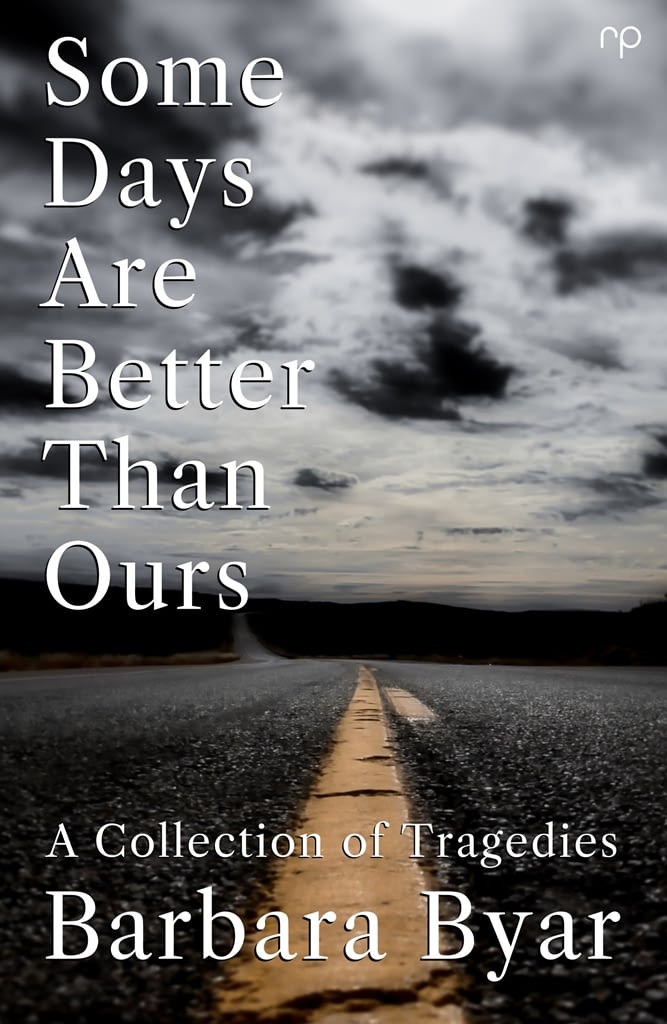REVIEW // by Emily Collins
Some Days Are Better Than Ours: A Collection of Tragedies by Barbara Byar

Reflex Press, £8.99
Barbara Byar’s collection, Some Days Are Better Than Ours: A Collection of Tragedies, rages against normality, a feat that hits close to home in the COVID-19 era. As we, in fear and isolation, long for normality, Byar’s writing reminds us that normality is rife with injustice. We’re reminded in twenty-nine different stories, each piece rendered in less than a thousand words. In a recent interview, Byar called flash fiction “Word Perfume.” She believes “[flash] distills the language into its essence, and hopefully the scent of the stories linger.” Successful flash fiction expands and condenses. Like all brave works of fiction, Byar’s “word perfume” has filled my mind and continues to linger.
So why read a collection of tragedies in times of pandemics or impeachment hearings or collective trauma? Perhaps now is as good of a time as ever to confront the underbelly of human nature or the heart’s grisly desires. Art has the power to meet us wherever we are and lay bare what’s been hidden. Byar’s work exposes what’s been hidden within her characters. The result is a flurry of images and accounts that span across countries, wars, and nuclear families, with characters riding “an endless sea of need and futility.” I want to throw these characters a line, and I want them to tell me what it’s like to drown.
I want to throw these characters a line, and I want them to tell me what it’s like to drown.
The stories in this debut brim with violence and secrecy. Two children watch their father hammer away at “something” in the backyard, his screams as “loud as Mummy’s quiet.” A German woman finds solace in feeding POWs during WWII, then dies in the arms of her lover in the bombing of Dresden. An isolated girl confides in a stuffed teddy bear that loves her so much it would and does kill for her.
Dark humor surfaces when we least expect, like in “Various Things That Crossed Her Mind,” when a nontraditional college student reflects on her classes, “Matisse reminds her of L.A. She likes neither. Mostly because she needs sunglasses for both.” A woman on the run reflects on the dissolution of her marriage, “It was a fuck made in heaven. He was half her age and twice her height, but none of that mattered lying down.” In “The Whole of the Moon,” another separation piece, the narrator observes how the years have treated her ex: “The fading sun spotlighted him at just the wrong angle. He’d gained as much weight drinking as she’d lost on her diet of heartbreak and Valium.”
Byar’s sensory language should earn her a loyal readership among poets and lyrical writers. Lines like, “I am salty tears stinging; broken kisses burning; sympathy soothing. I am here,” and “In her dreams she pirouettes through galaxies, leaps through dimensions, lands with a thump on a wooden stage in a parallel universe. Bows,” stay with me and prove that Byar can reach those sensual, dreamy places even in stories where hope is hard to find. My favorite characters in this collection are the ones that possess a tender resilience, like Tommy in “All the Things We Cannot Say,” who carves his feelings for his best friend, Lissy, into the trunk of a tree. When she reads the carving, she looks at Tommy, and “he, shivering and cold, was brave and did not look away.”
In Byar’s world, people are heartless, hurting, and striving. She’s not the first writer to focus on tragedy or duress, but her approach to these themes is brutal, captivating, and deeply personal. Though not every piece of Byar’s writing hints at autobiography, I trust her take on hardship for she, too, has lived it. Before the publication of Some Days Are Better Than Ours, Byar endured a series of personal and professional disappointments, such as unemployment and cancellation of her first novel’s publication. Rather than hiding, Byar got back to work. She channeled her rage into a new project, “a flurry of flash,” as she describes this collection on her author website.
Byar writes of the downtrodden without fetishization or pity. This is the beauty of writing from personal experience when one’s experiences are neither glamorous nor one-dimensional. While Some Days Are Better Than Ours doesn’t offer its readers much hope, perhaps we can find solace in Byar’s ability to transmute dread into gold. “Did I give up like I wanted?” Byar writers in her blog. “Hell no! I wrote.” And her writing has paid off. She has received nominations for the Pushcart Prize and Best Small Fictions and mentors emerging writers in Ireland’s Thursday Night Writers Group.
In this story collection, Byar lays bares the rage of a disillusioned heart in very few words. Some Days Are Better Than Ours spotlights the dark side of humanity through poetic language that proves tragedy can be a source of strength.
